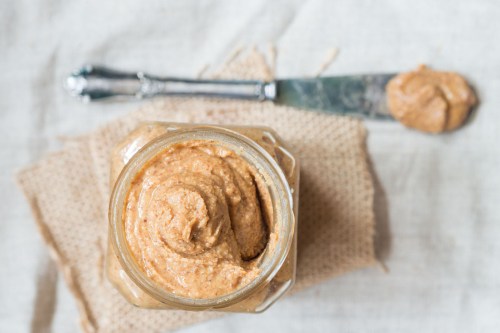Sunflower butter vs almond butter: which is better for you?
If you're curious about sunflower butter nutrition, look no further. Here's how the popular pantry staple compares to almond butter.

Almond butter is creamy, loaded with protein, and is downright delicious. These are just facts. But sunflower butter is going more mainstream too, giving the OG pantry staple some friendly competition at the grocery store—particularly in the freezer section.
Ben & Jerry’s just aded three new flavors to its non-dairy line—”Milk” & Cookies, Crème Brûlée Cookie, and Mint Chocolate Cookie—and they’re are all made from sunflower butter. Since the existing vegan flavors the company offers are almond-based, this gives anyone with a nut allergy the chance to get in on the fun. With the popularity of sunflower butter on the rise, you may be wondering how it holds up to the OG of the nut butter world. And while it doesn’t have quite as many body-bettering qualities, it’s pretty darn close.
According to registered dietitian Sameera Khan, RD, almond butter will always be the queen of the nut butter world, as it’s one of the most nutrient-dense options available with 7 grams of protein, 6 grams of carbohydrates, and 3 grams of fiber per two-tablespoon serving. It’s also loaded with potassium, iron, calcium, phosphorus, and magnesium. But in terms of the best butter for anyone with allergies, sunflower butter is the best nut-free option to go with.
When it comes to sunflower butter nutrition, the option contains 6 grams of protein, 7 grams of carbohydrates, 2 grams of fiber per two-tablespoon serving. Plus, Kahn says a single tablespoon provides 40 percent of your daily recommended intake of vitamin E. So if you’re trying to decide between sunflower butter and almond butter—whether you’re making toast or eating ice cream—you don’t have to. There’s certainly room in your shopping cart for both.
Find out whether peanut butter is healthy or not:
If you’re looking for other butters to try, go for this watermelon seed spread. Then compare all the peanut butter alternatives available on store shelves.
Sign Up for Our Daily Newsletter
Get all the latest in wellness, trends, food, fitness, beauty, and more delivered right to your inbox.
Got it, you've been added to our email list.










